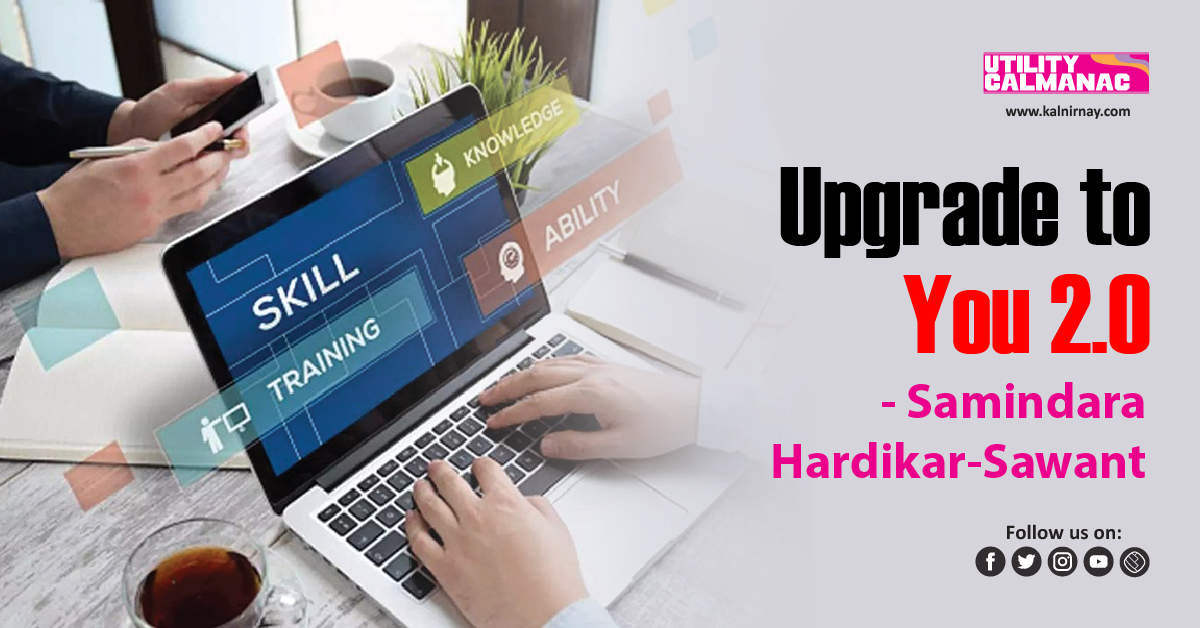Upgrade to ‘You 2.0’
Invest time and effort in upgrading your professional skills and staying relevant.
The ongoing pandemic has changed the pace of the professional world. Technology, research and innovation are forcing professionals to be on their toes. In addition to expertise and know-how in their domain, the new world requires refined soft skills, interpersonal skills and flexibility and agility towards change.
One has to push beyond their comfort zone to reinvent, upgrade or sharpen one’s understanding of their industry or the market or to learn a new skill.
Why Upgrade?
Gone are the days when you could rest on your laurels forever. For eg, It is not enough for doctors to just get a medical degree. They have to keep abreast of the latest treatment protocols, innovations and medicinal breakthroughs to keep their practice relevant. This is true across industries. An IT professional has to keep learning new programming languages and keep up with the languages they already know as they keep evolving every single day!
No matter which profession you belong to, upgrading your skills is crucial to maintaining that competitive edge. In addition to keeping abreast of advances in your industry and profession, you can also identify the right programmes, initiatives and courses to enhance your CV. Here are some options:
Continuing Education Programmes :
Short training courses within your field aimed at teaching a specific new skill or technology can(upgrade) take you closer to your professional goals. For instance, if you are a person working in finance, depending on your work profile, you can consider a short law course focusing on changing tax laws or you can join a crash course meant for understanding a new accounting system or you can look at certifications that will put you at a better position at work. Certain roles have clear pathways in terms of certifications and mandated compliance courses for keeping updated. In some roles, you may have to do some research to find out what your next steps should be.
Conferences and Workshops :
These can be a fantastic way to learn(upgrade) about the latest developments in your industry and to network with the people who matter. Health, hospitality and education industries already hold international conferences and seminars. Find out if such events happen in your industry and attend the ones relevant to your role.
Management Development Programmes :
MDPs, as they are popularly known, are short-duration, intensive managerial skills programmes that are offered by several business schools in the country. Usually, your organisation is required to sponsor or endorse you for these as they can be quite expensive. An MDP will refresh your knowledge and will also renew your energy and motivation for work.
Further Education :
You could leap and enrol into a professional degree, full-time or part-time. You could also sign up for a doctoral programme or some other full-time training. This might call for a complete overhaul of priorities for both you and your family. In addition to requiring more of your time, studying further may also have financial implications.
Online/ Distance Learning Programmes :
The internet has opened up the whole world for us. Especially after the pandemic, most things have moved to a digital or virtual presence. Many universities are offering excellent online courses. Identify the right training programme for yourself and get started!
Coaching and Mentoring :
Professionals who may be looking for clarity on how to take their careers to the next level may benefit from finding a mentor or a coach. Certified coaches can help you define goals and chalk out a path aligned with these goals.
Before you take the leap:
Whether you choose to go for advanced education or a short course, it is going to affect your home and office. Make sure you plan. Ensure that your family members and colleagues are ready to support you.
It is important to have your immediate family in your corner. Seek their opinion, and discuss how you’re going to manage your time and finances. If you need to take a sabbatical or a long leave of absence or flexible work hours, you need to discuss this formally with your superiors. Seek their opinion in terms of the next steps. Also, when you do this, present a plan to make up for your absence or reduced presence at work.
Plan and prioritise. You may have to cut back on socialising or you might have to drop out of your music band. You have to get super organised to get things done efficiently. Make lists, plan schedules and stick to them.
Whether it is a course you’re signing up for or a certification programme, there is going to be a cost attached to it. If you’re taking a sabbatical, it may mean a reduction in income. To assess your finances to make sure that you can afford to go ahead with the course. Another good way is to start planning for your course in advance by investing in SIPs or setting aside a lump sum in any reliable financial instrument. This will be particularly useful if you’re planning to go for a full-time or part-time degree or if you are keen on an MDP.
The road to the top is often riddled with challenges, but a timely investment in your future will help you navigate this path smoothly.
To read more English blogs, visit our blog section.
Samindara Hardikar-Sawant
The author runs a career counselling centre.

